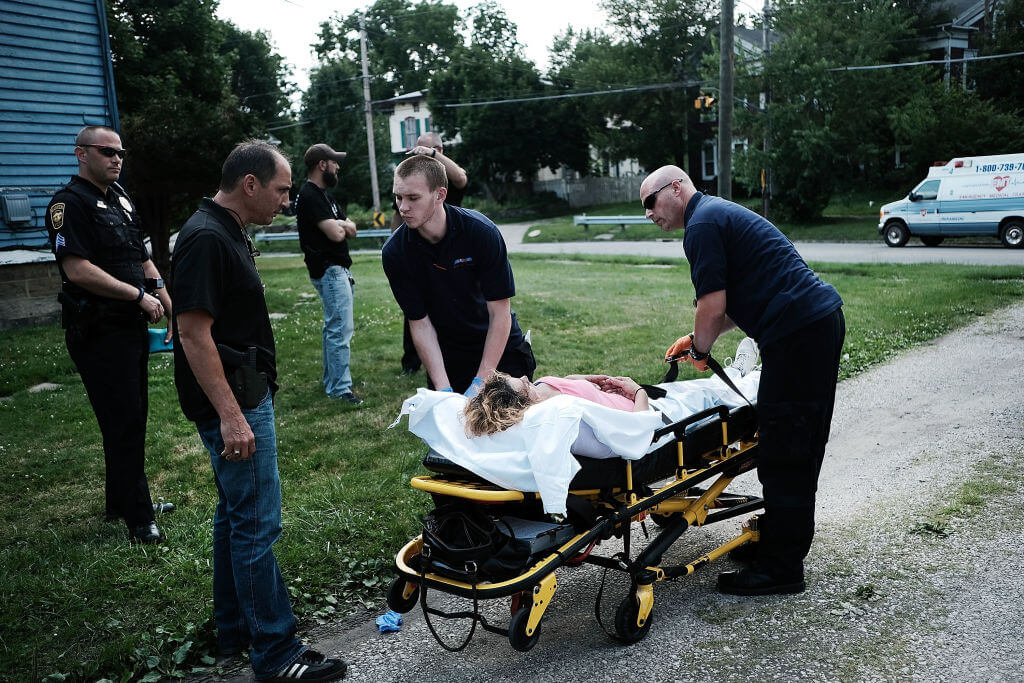Nice Jewish kids struggle with addiction, too. It’s past time for a Jewish solution
Addiction and the stigma that goes with it has been a silent but deadly presence in our communities

Medical workers and police treat a woman who has overdosed on heroin, the second case in a matter of minutes, on July 14, 2017 in Warren, Ohio. Photo by Spencer Platt/Getty Images
The stigma of addiction in our community is deeply ingrained and ever-present. We know this because we’ve each experienced it firsthand.
Rabbi Michael Perice: As a young, enthusiastic rabbinical intern at a local synagogue, I once suggested in an “ideas meeting” that the synagogue offer a program addressing addiction and recovery from a Jewish perspective. They responded: “That’s not an issue that affects our community.” Unbeknownst to them, I was several years in recovery from opioid addiction.
I remember thinking, how could I ever possibly share my story if my fellow Jews don’t think Jews can be addicts?
Marla Kaufman: Fresh off a summer teen trip to Israel, our older son’s quick descent into addiction unfolded. We were leaders in our Jewish community, deeply invested in Jewish life. Facing this devastating crisis, we turned to our synagogue for support. We not only found a lack of resources, but also a profound lack of understanding and compassion. After sending our son (who is now in long-term recovery) away for treatment, the clear message we received is: “Your family’s experience is an outlier.”
The judgment and shame we faced led us to be unaffiliated for four years.
Perice & Kaufman: As Jewish community recovery advocates, we hear similar stories all the time, even though our experiences happened several years ago.
The real shanda lies not with the individuals and families touched by addiction, but with the greater Jewish community when it perpetuates the myth that we are not as vulnerable as others to the ravages of addiction. A mistaken belief that says nice Jewish kids (and certainly rabbis!) don’t get addicted to drugs or alcohol is extremely harmful to those in our community who deserve our help and support.
This denial is confirmed by the fact that no large-scale study of substance use disorder (SUD) in the Jewish community has been undertaken. So while we do not yet have solid Jewish-specific statistics, the larger portrait of addiction in America provides a useful lens.
SAMSHA’s (Substance Abuse and Mental Health Services Administration) annual National Survey on Drug Use and Health for 2020 reported that more than 40 million Americans have an active SUD, with only 6.5% receiving treatment. In May, the CDC released the heartbreaking news that drug overdoses in the U.S. reached an all-time high, killing more than 107,000 souls in 2021. And for those not tracking year to year, that is a nearly 15% increase over 2020, not to mention the 30% jump from 2019 to 2020.
The hopeful news is that over 22 million Americans are in long-term recovery, according to the Recovery Research Institute of Massachusetts General Hospital.
We know that Jews are among these statistics. It’s past time for the Jewish community to live up to these words from our Torah: “If there be among you a person with needs, you shall not harden your heart, but you shall surely open your hand” (Deuteronomy 15:7).
The will to truly address addiction in Jewish communities has to come from the highest levels of Jewish leadership and be part of the bigger conversation on diversity, equity and inclusion and mental health. Our national Jewish umbrella organizations and major philanthropic foundations need to embrace this issue as the pressing priority it is, and as such, invest significant time, money and resources.
Robust and ongoing education for clergy and communal professionals through rabbinical and cantorial schools, Jewish education graduate programs, national denomination movements and major organizations needs to be a priority.
Individual Jewish communities must get on board as well by fostering collaboration across the spectrum of synagogues and organizations to put addiction and recovery on the community agenda. Programs and services could include addiction-specific counseling and support groups, recovery meetings in Jewish spaces and increasing awareness through dedicated Shabbat services and holiday celebrations, offering youth prevention education, hosting workshops and speakers and having books on addiction and recovery in synagogue and community libraries.
While some of this is happening in some communities, it’s hit and miss, and largely without the necessary consistency to make a real difference.
In 2016, journalist and author Stephen Fried wrote, “It has proved nearly impossible to get most communities — or, frankly, most families — to view mental illness and addiction as daily, weekly, monthly, yearly, lifelong realities and medical illnesses.”
This is still true today. It’s going to take a great deal of commitment from our community to address the addiction epidemic meaningfully and consistently. Jewish families impacted by this disease deserve to feel seen, welcomed and supported without reservation or judgment. We would have healed faster and had fewer scars had we been embraced with understanding and compassion.
Let’s no longer ignore those touched by addiction. The time for change is now, and the Jewish community can do this.
To contact the authors, email editorial@forward.com.
A message from our CEO & publisher Rachel Fishman Feddersen
I hope you appreciated this article. Before you go, I’d like to ask you to please support the Forward’s award-winning, nonprofit journalism during this critical time.
We’ve set a goal to raise $260,000 by December 31. That’s an ambitious goal, but one that will give us the resources we need to invest in the high quality news, opinion, analysis and cultural coverage that isn’t available anywhere else.
If you feel inspired to make an impact, now is the time to give something back. Join us as a member at your most generous level.
— Rachel Fishman Feddersen, Publisher and CEO